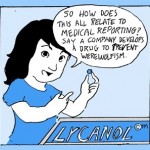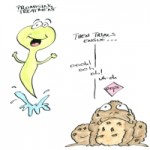
This cartoon byRoxanne Palmer on the International Business Times website nicely illustrates how relative measures of efficacy can be used to misrepresent how much benefit a treatment actually gives.
Okumaya devam edin »
 Türkçe
Türkçe

This cartoon byRoxanne Palmer on the International Business Times website nicely illustrates how relative measures of efficacy can be used to misrepresent how much benefit a treatment actually gives.
Okumaya devam edin »

This video is a clip of a BBC documentary in which Iain Chalmers and Dan Cruikshank recreate James Lind’s celebrated experiment to test treatments for scurvy.

In this video Gwen Olsen, a former pharmaceutical sales representative, talks about manipulating doctors to sell more drugs.

This video provides an example of the application of the scientific method to the claims of quackery! Featuring Emily Rosa, the youngest person ever to publish in the prestigious JAMA — Journal of the American Medical Association. Okumaya devam edin »

“FDA approves new drug the first drug designed to treat the symptoms of excessive perkiness.”
This humorous video by the Onion illustrates some of the tactics used to push unnecessary treatments or “sell” sickness. The video uses a fictitous treatment called “Despondex” for this purpose, Okumaya devam edin »

“A New Epidemic” is a humourous video parody of the tactics used to “sell” disease by some organisations. It uses a fictitious disease called Motivational Deficiency Disorder to make its point.
Okumaya devam edin »

In this video tutorial, Amanda Burls explores the ways in which evidence about the effectiveness of genetic testing can be misrepresented in advertising
Okumaya devam edin »

Statistically funny is a blog by Hilda Bastian containing her own cartoons illustrating important concepts in research and evidence-based health care.
“The comedic possibilities of clinical epidemiology are known to be limitless.”
You can follow the cartoons on twitter or sign up for email alerts
Okumaya devam edin »

CASP UK helps people to find and interpret the best available evidence from health research.
It is part of an international network that shares a commitment to self-directed learning and promoting better understanding of science.